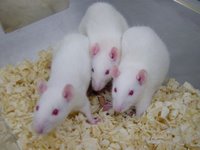
If you google for "animal research" and then switch to the pictures section you will see many very upsetting pictures depicting animals that have been used in research. I first want to point out that these pictures are not representative of the way it looks in most laboratories. Secondly, the animals in the pictures may not have suffered to anywhere near the extent that people uploading these pictures want to make you believe.
I do not think that being a laboratory animal is a great life for an animal, however, nor do I think that it is the worst fate an animal can suffer. I would personally much rather be a laboratory rat than a cow or a chicken that is slaughtered to become food for us. There are a number of reasons why animal research is not as bad as some people want us to believe. First of all, only in a minority of all the conducted experiments do the animals experience any pain, and when they do they are nearly always given anesthetics (one exception to this is when pain is the research subject in which case it is a necessary evil). Secondly, researchers, in order to get good data, must make sure that their animals are feeling well. Data from sick laboratory animals is worthless. Of course, the well being of laboratory animals is also inspected by committees on a regular basis and labs which do not take proper care of the animals will be shut down. Thirdly, for me, personally, working with laboratory animals actually made me value animals more than before. Rats are, believe it or not, smart playful and social, and working with them have made me more concerned about animal welfare in general. I now buy ecological meat, eggs from free outdoor hens (free walking indoor is no good either!), and in general try to buy products that have not caused unnecessary pain for any animals. This brings me to my next point.
I often hear from different people that many animal experiment that are carried out are unnecessary. To some extent I agree, I think that animal experiments that are done to develop new cosmetics are definitely unnecessary, let us use what we have got and spare these animals. Nevertheless, to conduct an experiment involving animals at a university one have to argue, very convincingly, that the research can further our knowledge in some way, and one must justify any hypothetical pain that the animals must endure. It is also not true that there are other methods that we could use just as well as animal research. Sure, studies can be done in vitro (that is, in a dish), but today these methods cannot replace animal research.
In the end I guess it all comes down to what your values are. Is it worth it to sacrifice laboratory animals in order to develop medicines that can cure us as well as animals. My answer is yes, but I don't think it is entirely obvious, so think for yourself. Perhaps we should be content with just living 48 years instead of around 75 years, and perhaps we should just accept that some diseases will kill us (I am not being sarcastic here).
I want to end with a list of some of the discoveries that would not have been possible was it not for animal research, you can find a much longer list and more information about animal research here. Our dept to laboratory animals, as you can see from the list below (remember this is not a complete list), is indeed great. The laboratory animals have helped us alot, and for that they deserve our respect, but should we stop doing these types of experiments?
Vaccines: Anthrax, Smallpox, Polio, Yellow fever, Measles, Hapatitis, Whooping cough...
Drugs: Insulin, Antibiotics, Birth control pills, pain killers, anti malaria drugs, chemotherapy...
Treatable conditions: Anemia, PKU, Herpes, Allergies, Chlamydia...
Life prolonging treatments: Diabetes, Epilepsy, Leukemia...
Other major discoveries: DNA, Virus, Electron microscope, ECG, EEG, Pacemaker, Artificial hips, x-rays, monoclonal antibodies, ultrasound, MRI, Artificial limbs, Effects of smoking alcohol and drugs, How lifestyle affects health
Surgery: Blood transfusions, Coronary bypass, Organ transplants, Breast cancer






